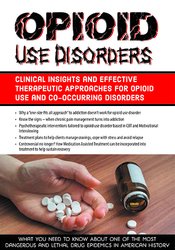
A national emergency … the worst drug crisis in U.S. history. The grim news surrounding opioid abuse continues to make headlines.
But you know what lies behind the headlines. People. People whose lives have been devastated. Jail time and lost jobs. Shattered families. Early deaths and grieving families. People like you and I, prescribed a highly addictive substance to treat their chronic pain or after a minor medical procedure, who find themselves in a dangerous free fall that leaves their lives in ruin. People who walk through your door looking to you for help.
Yet opioid disorders are substantially different from other addictions. Drug-driven brain change and physical dependence, coupled with a substance that perilously slows breathing and heart rate have created a deadly epidemic of unprecedented proportions. Super potent synthetics like Fentanyl are flowing into our cities and towns; a cheap but deadly substitute putting the lives of opioid abusers at risk. And many individuals with opioid use disorders have at least one co-occurring mental health problem that must be addressed in the effort to achieve and sustain recovery.
A one-size fits all approach to addiction simply won’t suffice.
Watch this critical recording and get the tools you need to end the suffering and bring hope and healing to your clients!
Key Benefits of this course:
| File type | File name | Number of pages | |
|---|---|---|---|
| Manual - - Opioid Use Disorders (2.67 MB) | Available after Purchase |

Hayden Center, PhD, LPC, has been treating individuals and families who suffer from substance abuse disorders, including opioid use disorder, for over 25 years in a private practice setting. Dr. Center most recently served as the evaluator for the Center for Substance Abuse Prevention’s (CSAP) Southeast Center for the Application of Prevention Technologies (SECAPT) and the Border Center for the Application of Prevention Technologies (BCAPT).
Dr. Center served as a consultant to the Alabama Governor’s Office of Drug Abuse Policy for 10 years and has worked with numerous state and local agencies in the state of Alabama.
He has provided over 200 trainings on the topics of science-based prevention, evaluation, risk and protective factors, co-occurring disorders, and other mental health and substance abuse issues. His current interests are providing training and technical assistance to increase the usage and effectiveness of evidence-based treatments and approaches.
In addition to his private practice, Dr. Center has taught in university settings for over 28 years. He teaches graduate-level courses in theories of psychotherapy, advanced objective testing, psychopharmacology, and undergraduate courses in psychology at Auburn University in Montgomery, Alabama. He earned his PhD in counselor education and Master of Science in psychology at Auburn University in Montgomery, Alabama.
Speaker Disclosures:
Please wait ...